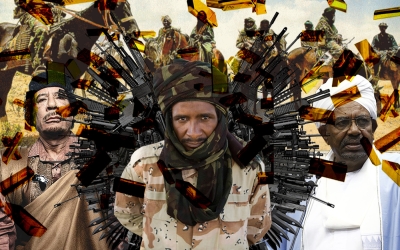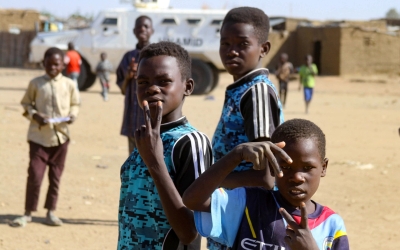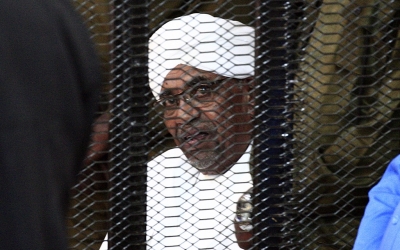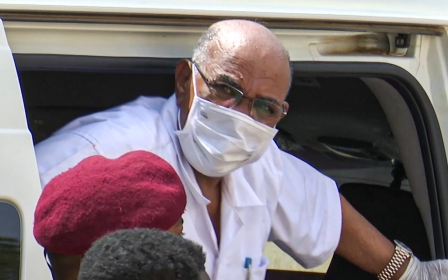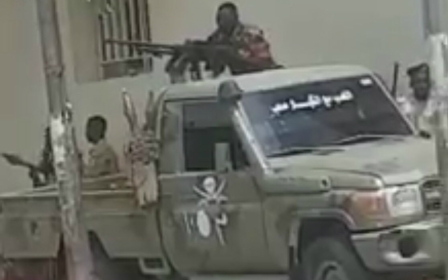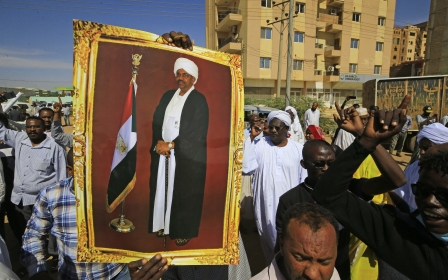Will Sudan hand over Bashir and his aides to ICC?
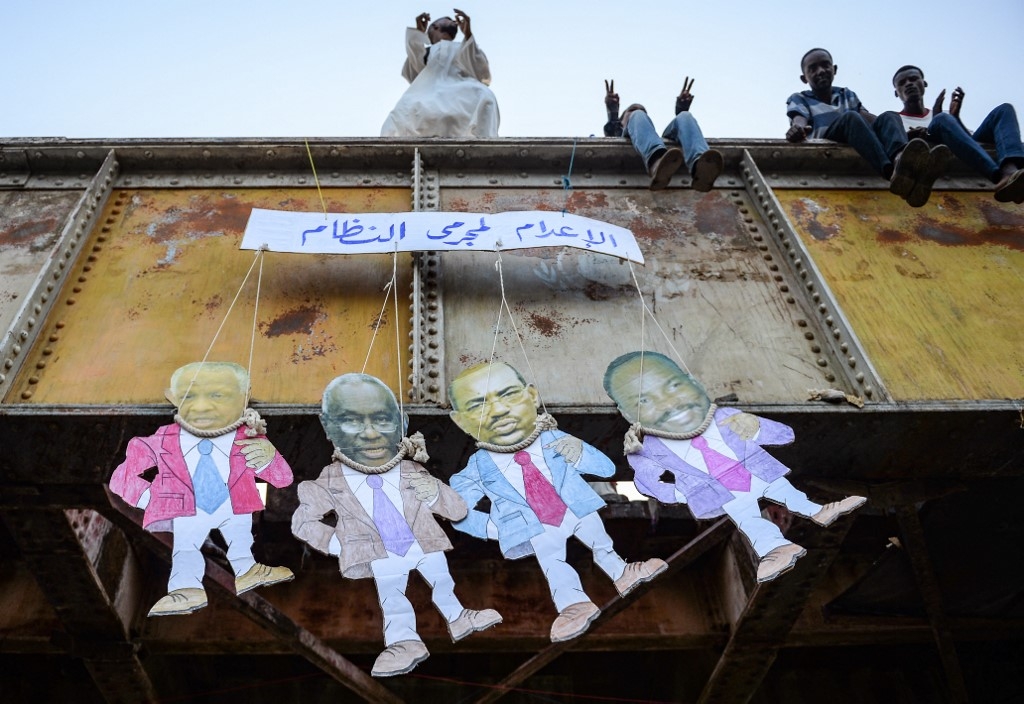
Sudan is in discussions with the International Criminal Court (ICC) to hand over one of the main aides of the ousted president Omar al-Bashir over crimes against humanity in the war-torn region of Darfur, a Sudanese official has disclosed.
The source, who spoke to Middle East Eye (MEE) on condition of anonymity because he is not authorised to talk to the media, revealed that the Sudanese transitional government has given initial approval to hand over Ahmed Haroun, a former minister of state for the interior who was indicted by the ICC in June 2007, to the Hague-based court soon.
'The government has given its initial acceptance to hand over Ahmed Haroun to the ICC for more investigation'
- Sudanese official
This comes after Sudan's minister of foreign affairs said the cabinet has approved the extradition of wanted officials to the ICC and gave its preliminary approval of the draft law on Sudan's accession to the Rome Statute that established the ICC.
Both decisions are expected to be ratified in a joint meeting between the cabinet and the Sovereignty Council within weeks.
However, the source explained that the handing over of Bashir and former defence minister Abdul-Rahim Mohammed Hussein, also wanted by the ICC, is yet to be finalised despite Sudanese media reports to the contrary.
New MEE newsletter: Jerusalem Dispatch
Sign up to get the latest insights and analysis on Israel-Palestine, alongside Turkey Unpacked and other MEE newsletters
Bashir, currently on trial in Khartoum over the 1989 military coup that propelled him to power, is wanted by the ICC for alleged war crimes, genocide, and crimes against humanity during the conflict in Darfur, the region in western Sudan where an estimated 300,000 people were killed and millions displaced from 2003 onwards.
The longtime autocrat was removed from office in April 2019 following months of protests against his rule. Sudan has since been ruled by the hybrid civilian-military Sovereignty Council, formed by the Transitional Military Council and the Forces of Freedom and Change, based on an agreement on a 39-month transitional period.
Evidence against Haroun
The source told MEE on Friday that Haroun is expected to be handed over to the ICC soon, especially after more evidence was unearthed against him during an investigation into the former senior Janjaweed militia leader Ali Kushayb.
"The government has given its initial acceptance to hand over Ahmed Haroun to the ICC for more investigation, as there is a lot of evidence and testimonies that he was also involved in the same case as Kushayb, who is currently on trial by the court," the official told MEE.
On 9 July, the ICC confirmed the charges against Kushayb, whose real name is Ali Mohammed Ali Abdel-Rahman, and referred him to trial before a Trial Chamber, after he surrendered himself voluntarily in the Central African Republic (CAR) on 9 June 2020.
The court accuses Kushayb of 31 counts of war crimes and crimes against humanity, allegedly committed between August 2003 and at least April 2004 in Kodoom, Bindisi, Mukjar, Deleig, and surrounding areas in Darfur.
Bashir was the first sitting president to be indicted by the ICC, in 2009, over war crimes, crimes against humanity, and genocide in Darfur.
The source added that there is a strong conviction within the ICC that Haroun is the person responsible for arming the Sudanese militias in Darfur between 2003 and 2004.
He added that "in the worst scenario, the court will conduct the investigation against him in Khartoum".
Bashir and his former defence minister Hussein are still facing several trials inside Sudan, including the trial over the 30 June 1989 military coup that brought him to power. The source explained that these cases, according to Sudanese legal norms, have to be heard first in front of local courts before the defendants can be handed the ICC.
An ICC arrest warrant against Hussein was issued in March 2012 over crimes against humanity committed in Darfur between 2003 and 2004.
On Thursday, ICC prosecutor Karim Khan announced that Sudan and the court had agreed on cooperation regarding Darfur cases.
Addressing a press conference in Khartoum, the prosecutor said the court will open an office in Khartoum. He added that he will visit Darfur in November to conduct further investigation in the case of Kushayb, as well as the other outstanding arrest warrants. Khan has also asked the government to provide more information on Kushayb.
The cooperation will allow the ICC delegation access to data, the exchange of information, meetings, and other facilitations. He added that such collaboration will help the ICC build strong cases.
Khan said that he will deploy a full-time ICC team to Khartoum, a step welcomed by Sudanese authorities.
'Historic decision'
Sudanese Internally Displaced People (IDP) in the Darfur region, pro-democracy protesters, human rights defenders, and political activists have strongly welcomed the decision to hand over Bashir-era officials. Yet many are waiting for a clear roadmap for their prosecution.
Adam Rigal, a spokesman of the Committee of the Darfur IDPs and Refugees described the decision as a "real victory" for the war victims but called on the transitional government to take quick practical actions towards handing over the indicted leaders.
"We heard the same government announcement in the past, but we don't know when it will take place and whether the suspects will be tried inside or outside Sudan. In such a serious issue, the decision should be clearer," he told MEE.
Ahmed Almubarak, a member of the same NGO, described the announcement as a "historic decision," warning that the army may obstruct it at the joint meeting between the Council of Ministers and the Sovereignty Council, which is authorised to make the final approval of this decision as well as that of joining the ICC itself.
Meanwhile, Washington, which is not part of the ICC agreement, has welcomed the Sudanese decision, urging Khartoum to implement it.
"We do welcome the reconfirmation by the council of ministers, or the cabinet, of its intention to hand over former president Bashir and other former officials wanted by the ICC for crimes in Darfur," US State Department spokesperson Ned Price told a press conference in Washington on Wednesday.
"We look forward to joint action by the cabinet and the sovereign council to finalise and execute this decision. We urge Sudan to continue to cooperate with the ICC by handing over those subject to arrest warrants and by cooperating on the provision of the requested evidence. Doing so would be a major step for Sudan in the fight against decades of impunity," Price said.
A 'trap' for other army leaders
However, the head of Bashir's defence team, Mohamed Al-Hassan Alamin, has strongly criticised the government's intention to cooperate with the ICC, considering this step – if it happens - a threat to Sudanese "national security".
Alamin warned that the court and some elements in the transitional government are behind the push for ICC prosecutions.
'The current army leaders and others may also be targeted later on, so the army has to be cautious before falling into this trap'
- Mohamed Al-Hassan Alamin, Bashir's lawyer
"This is a real threat to the country and the army in particular," he told MEE. "“Bashir does not just represent himself, he also represents the army and the government. Secondly, there are talks about the probability of investigations and more arrest warrants against 51 individuals that are allegedly involved in the same case," he said.
"The current army leaders and others may also be targeted later on, so the army has to be cautious before falling into this trap."
The potential ICC prosecution has been resisted by some military elements that once belonged to Bashir's state apparatus and who currently serve in the transitional government.
For example, Mohamed Dagalo, also known as Hemeti, heads the Rapid Support Forces (RSF), a paramilitary group composed of multiple Janjaweed militia groups accused of crimes against humanity in Darfur and deadly suppression of the 2019 uprising. He now serves as deputy head of the Sovereign Council.
Furthermore, Alamin, who was also a leader in Bashir's dissolved ruling party, said that Sudan was not part of the ICC at the time of the alleged crimes, so he believes the court has no jurisdiction to prosecute anyone accused of crimes during that period.
He added that Bashir is now under trial in connection with different cases, including the 1989 military coup and other corruption cases, so he "cannot be handed over before his trial process inside Sudan is finished".
However, Sudanese human rights researcher Mohamed Badawi said Sudan' government has the full right to hand over the indicted people to the ICC, even without joining the Rome Statute, because the case was referred to the ICC by the UN Security Council and Sudan has to be committed to that.
Badawi, a senior researcher in the African Centre for Justice and Peace Studies, believes that the surrender of Kushayb, in addition to his testimonies at the court, has added more pressure on the different sides.
"The disputes over the appointment of the general prosecutor and the chief justice, and the intervention of the sovereign council in the judicial system and in the investigation in some cases, as well as the failure of the former Darfur prosecutor, are all factors that put pressure on all sides, by deepening the impression that Sudan's judiciary is unwilling and unable to achieve justice," he said.
However, he expects that the civilian and military components of the transitional government will be divided over this issue despite their remarks about cooperation with the court.
"Even if Bashir is handed over to the ICC, in the end, the role of the court is complementary to the Sudanese judiciary system. Reforming the judiciary is crucial to achieving justice in Sudan."
Middle East Eye delivers independent and unrivalled coverage and analysis of the Middle East, North Africa and beyond. To learn more about republishing this content and the associated fees, please fill out this form. More about MEE can be found here.


